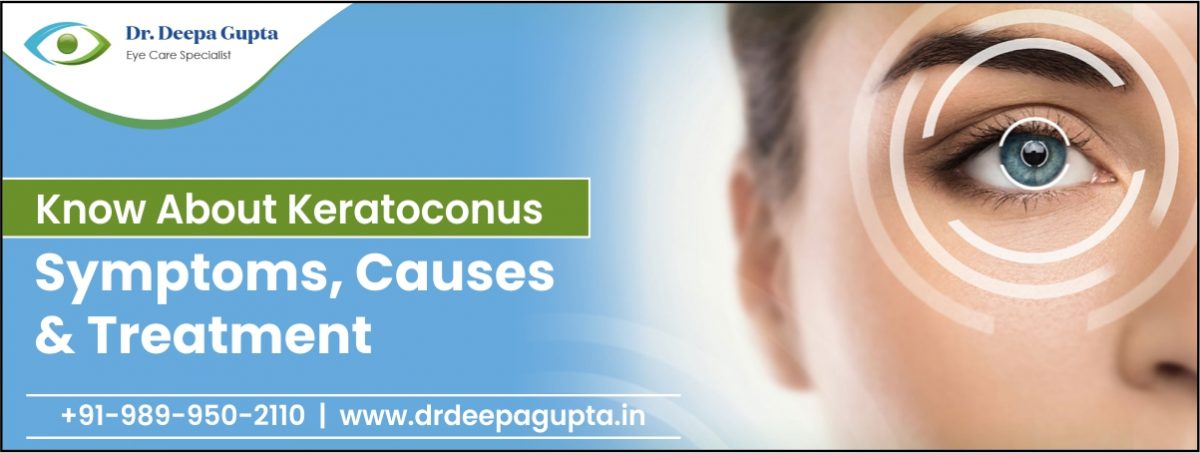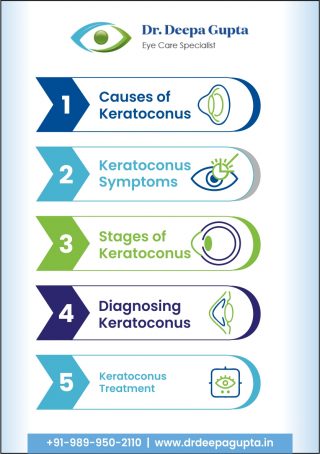Know About Keratoconus

What is Keratoconus
Keratoconus is a dynamic condition characterized by diminishing the cornea that causes it to lose its symmetrical arch shape. It causes the cornea (the clear surface on the front of the eye) to lean continuously and bulge into a cone shape. The cone-formed cornea further leads to nearsightedness( myopia) and astigmatism. It results in blurry and distorted vision.
Causes of Keratoconus
No predisposing factor is yet known for causing Keratoconus. It is believed that both hereditary and environmental factors contribute to its development. Some of the causative agents can be:
- Family History: It is believed that some individuals with Keratoconus may have genes that predispose them to develop the condition if specific environmental conditions are present.
- Underlying illnesses: There may be a direct cause and effect relationship between certain underlying illnesses and Keratoconus, although this has not been proven. These conditions include Leber congenital amaurosis, Marfan syndrome, sleep apnea, asthma, and a few connective tissue diseases such as brittle cornea syndrome and Down syndrome.
- Environment-related Factors: Wearing contact lenses, excessive eye rubbing, and Chronic eye inflammation caused by asthma, allergies, etc., are some of the environmental risk factors that might lead to the development of Keratoconus.
Keratoconus Symptoms
Keratoconus Signs and symptoms are not exhibited early. The absence of symptoms in the early stages is normal for people suffering with keratoconus. As the problem worsens, your cornea’s asymmetry may cause mild to severe vision distortion and loss of vision.
Some of the common visible signs of keratoconus symptoms include
- Hazy, misaligned, or deteriorating vision
- Heightened sensitivity to brightness and light
- Driving issues at night, including haloes or streaks around bright lights
- Frequently changing prescription for glasses
- Monocular diplopia, or double vision in both eyes
- Headaches or itchy eyes
- Short-sightedness (myopia)
- Wounds on the cornea
- The corneal tissue thinning
Stages of Keratoconus
Keratoconus has different stages based on the worsening health of the eye. The three essential stages of Keratoconus are:
- Early/Mild: Keratoconus might not exhibit any symptoms in the early stages. Glasses or contact lenses may be recommended for astigmatism and short-sightedness.
- Moderate: At this point, your cornea’s shape and possible corneal thinning changes are visible. Cross-linking was frequently used to stop the progression of Keratoconus. It may be used with laser treatment to enhance vision and lessen or regularise astigmatism. Your scans and the condition of your eyes determine whether you are a candidate for keratoconus treatment.
Advanced: At this most advanced stage, You’ll probably have significant corneal scarring and thinning. Cross-linking development can help to treat Keratoconus using corneal ring segments and corneal transplants.
Diagnosing Keratoconus
As early stages of keratoconus condition have no symptoms, we frequently diagnose Keratoconus during an evaluation for laser vision correction. We will screen for Keratoconus if you have a diagnosis of astigmatism that is quickly changing. An eye specialist might evaluate your eyes and symptoms during your consultation. They might also discuss risk factors, including rubbing your eyes and Keratoconus in the family.
Using AI-powered technology, Corneal topography scans offer a complete examination of your cornea’s structure, which is the most accurate way to diagnose Keratoconus.
Keratoconus Treatment
The various options are available for the keratoconus treatment based on the Detroit conditions. Some of the commonly used line of Keratoconus treatment are:
- Glass or soft lens: The early stages of Keratoconus can be improved with glasses or soft contact lenses. As the condition worsens, special hard contacts (rigid gas permeable contacts) may be needed.
- Corneal Transplant: When glasses or contact lenses can no longer enhance eyesight due to advanced Keratoconus, Keratoconus Eye surgery is recommended. A corneal transplant is a type of Keratoconus Surgery. During a corneal transplant, the damaged portion of the cornea is removed and replaced with a healthy donor cornea.
- Cross-Linking: A more recent therapy that slows or stops keratoconus progression is collagen cross-linking. To strengthen the collagen fibers in the cornea, riboflavin (vitamin B12) drops and UV radiation is applied to the cornea. Cross-linking doesn’t cure keratoconus-related vision loss, but it prevents further loss.
- Keratoconus Laser treatment: Laser surgery is a solution when treating fruste and advanced Keratoconus. If the keratoconus apex has scars or nodules, keratoconus laser treatment is advised. In this situation, a keratoconus laser can be beneficial since it can flatten and regularise the CONUS. It enhances vision and ensures a greater contact lens tolerance.
- Keratoconus Eye Surgery: Due to pain, significant corneal thinning, or scarring, some keratoconus patients have trouble wearing contact lenses. If glasses cannot correct your vision, Keratoconus eye surgery may be suggested. Keratoplasty and Intracorneal ring segments are two commonly available surgeries.
Takeaway
As Keratoconus progresses, it may cause corneal thinning, scarring, and a severe loss of vision. You have the highest chance of reducing long-term impairments to your eyesight by getting a proper diagnosis and treatment for Keratoconus as soon as possible.
If you are exhibiting keratoconus symptoms, contact us. Using AI-powered technologies, our knowledgeable specialists identify Keratoconus. To schedule a keratoconus assessment and testing, contact one of our experts and schedule a consultation. We provide a well-defined opinion service to relieve your mind if you are concerned that another eye doctor might have overlooked your keratoconus symptoms.

